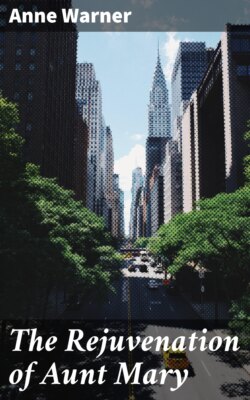Читать книгу The Rejuvenation of Aunt Mary - Warner Anne - Страница 6
На сайте Литреса книга снята с продажи.
Chapter Seven - Developments
ОглавлениеTable of Contents
It was during that drive the next morning that Jack buoyed up by memories of Saturday and hopes of coming Saturdays, poured out the history of his life at Mrs. Rosscott's knees. He told her the whole story of Aunt Mary, and his side of the cat, the cabman, and Kalamazoo. It interested her, for she had arrived too recently to have had the full details in the newspapers beforehand, but when he spoke of Aunt Mary's last letter she grew large-eyed and shook her head gravely.
"You will have to be very good now," she said seriously.
"Why?" he asked. "Just to keep from being disinherited? That wouldn't be so awful."
"Wouldn't it be awful to you?" she asked, turning her bright eyes upon him. "What could be worse?"
"Things," he said very vaguely.
Then she touched up the cob a little; and, after a minute or two, as she said nothing, he continued:
"I almost fancy quitting college and going to work. I was thinking about it last night." [pg 068]
She touched up the cob a little more, and remained silent.
Finally he said:
"What would you think of my doing that?"
"I don't know," she said slowly. "You see, I'm a great philosopher. I never fret or worry, because I regard it as useless; similarly, I never rebel at the way fate shapes my life—I regard that as something past helping. I believe in predestination; do you?"
She turned and looked at him so seriously—so unlike her riante self—that he felt startled, and did not know what to say for a minute.
Then:
"I don't know," he said slowly; "I don't know that I dare to. It rather startles me to think that maybe all of our future is laid out now."
"It doesn't startle me," she said. "It seems to me the natural plan of the universe. I believe that everything that crosses our path—down to the tiniest gnat—comes there in the fulfillment of a purpose."
"I'm sure that all the mosquitoes that ever crossed my path came there in the fulfillment of a purpose," Jack interrupted. "I never doubted that."
She smiled a little.
"It's the same with people," she went on.
"Do not let us play any longer,' she said. 'Let us be in earnest.'"
[pg 069]
"Only less painful," he interrupted again.
"Sometimes not," she said, with a look that silenced him. "Sometimes much more so—my Cousin Maude, for example."
"Hip, hip, hurrah for the mosquito!" he murmured. They laughed softly together. Then she grew earnest, and looked so grave that he became serious too.
"There is always a purpose," she said, with a touch of some feeling which he had never guessed at. "If you and I have met, it is because we are to have some influence over one another. I can't just see how; I can't form any idea—"
"I can," he said eagerly.
She looked up so suddenly and steadily that he was silent.
"Do not let us play any longer," she said. "Let us be in earnest."
"But I am in earnest," he asseverated.
"You don't know what I mean," she went on very gently. "You're in college. Let's fight it out on those lines if it takes all summer."
He looked up into her face and loved her better than ever for the frank kindliness that shone in her eyes.
"All right, if you say so," he vowed.
"I do say so," she said. "I like to see men stick it through in college if they begin. I like to [pg 070]see people finish up every one of life's jobs that they set out on."
"But I'm coming to see you in town, you know," he went on with great apparent irrelevance.
She laughed merrily.
"Yes, surely. You must promise me that.—No," she stopped and looked thoughtful, "I'll tell you what I want you to promise me. Promise me that you'll come once a week or else write me why you can't come. Will you?"
"You can't suppose that you'll ever see my handwriting under such circumstances—can you?" Jack asked.
She laughed again.
"Is it a promise?"
"Yes, it's a promise."
Oh, joy unmeasured in the time of spring! No other February like that had ever been for them—nor ever would be. The drive came to an end, the day came to an end, but the good-nights, which were good-bys, too, were not so fraught with hopelessness as he had dreaded, for the promise asked and given paved a broad road illuminated by the most hopeful kind of stars—a broad road leading straight from college to town—and his fancy showed him a figure treading it often. A figure that was his own.
[pg 071]
